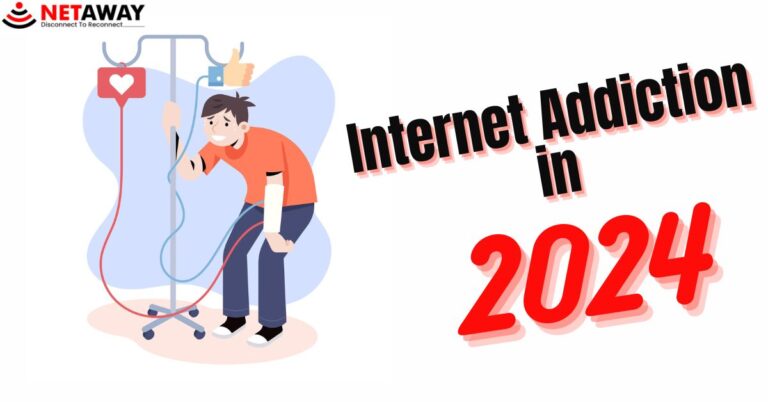
As technology continues to advance, the widespread use of the internet has become an integral part of our daily lives. However, this relentless dependency on the digital realm has raised concerns about internet overuse and its potential consequences on society. As we look into the future, it is apparent that the issue of excessive internet engagement will continue to gain prominence and pose significant challenges in 2024. A 2019 study by the Pew Research Center found that 60% of teens in the United States say they spend too much time on their phones. The study also found that 54% of teens say they have tried to cut down on their phone use, but have been unsuccessful.
According to a 2022 study by the Indian Council of Medical Research, 21.5% of Indian school-going adolescents have moderate and severe internet addiction. This means that about 1 in 5 Indian teens are addicted to the internet.
1. Increasing Accessibility and Connectivity
In 2024, internet accessibility will become even more widespread, with the proliferation of advanced technologies and improved global connectivity. This ease of access will lead to a surge in internet usage among individuals across various demographics, heightening the risk of developing unhealthy digital habits.Today, it is available to almost everyone, thanks to the proliferation of smartphones and other mobile devices. This means that people are spending more time online than ever before.
2. Evolving Social Media Landscape
The social media landscape is continuously evolving, with platforms becoming increasingly immersive and addictive. With the integration of virtual reality and augmented reality, social media platforms in 2024 will offer highly engaging experiences, further drawing users into a digital world that blurs the lines between reality and virtuality.
3. Escapism and Mental Health
In an increasingly fast-paced and stressful world, people often turn to the internet as a form of escapism. In 2024, the lure of online content will be more enticing than ever before, offering individuals an easy and readily available outlet to avoid real-life issues. This will contribute to a rise in internet addiction, as individuals seek solace and distraction in the virtual realm rather than addressing underlying mental health concerns.
4. Gamification and Behavioral Psychology
The integration of gamification and behavioral psychology techniques in digital products will intensify in 2024. Companies will employ sophisticated algorithms to personalize content, making it difficult for users to disengage. By exploiting psychological triggers, these platforms will encourage addictive behaviors, keeping users hooked for extended periods.For example, when you watch a video on YouTube, the platform will start recommending other videos that you might like.
5. Impact on Physical Health
Internet addiction can have adverse effects on physical health, including disrupted sleep patterns, eye strain, and sedentary lifestyles. As people spend more time online in 2024, these health concerns will become more prevalent, leading to a potential public health crisis if left unaddressed.
6. Educational Implications
With the integration of technology in educational settings, students will have greater exposure to the internet for learning purposes. However, the blurring of lines between educational and recreational internet usage can lead to academic underperformance and hinder the development of crucial interpersonal skills.
7. Economic Consequences
Internet addiction can have significant economic ramifications. In 2024, a substantial portion of the global workforce will be at risk of reduced productivity due to excessive internet usage, leading to financial losses for businesses and potential strain on economies.
8. Social Disconnection and Relationships
Despite the interconnectedness that the internet provides, excessive online engagement can lead to social disconnection in the real world. In 2024, the prevalence of internet addiction may contribute to weakened relationships, loneliness, and feelings of isolation among individuals.
Here are some tips for avoiding internet addiction:
- Set limits on your internet use. Decide how much time you want to spend online each day and stick to it.
- Take breaks from the internet. Get up and move around every 20-30 minutes to avoid getting too absorbed in your screen time.
- Find other activities to do. Make sure you have other hobbies and interests that you can enjoy outside of the internet.
- Be aware of the signs of addiction. If you find yourself spending more and more time online and you’re having trouble controlling your use, it’s time to seek help.
FAQs
Is phone addiction real?
Yes, phone addiction is a real behavioral addiction that involves excessive use of a smartphone or other mobile device. It can cause problems in one’s life, such as difficulty focusing, missing social events, and feeling anxious or restless when not using the phone.
What is the biggest risk on the internet?
The biggest risk on the internet is cybersecurity threats. These threats can range from malware and phishing attacks to data breaches and identity theft. It is important to be aware of these risks and take steps to protect yourself, such as using strong passwords, keeping your software up to date, and being careful about what information you share online.
Is internet addiction genetic?
The role of genetics in internet addiction is not fully understood, but research suggests that genetic factors may contribute to predisposition. However, environmental and behavioral factors also play a significant role in the development of internet addiction.
What is the addiction of internet called?
The addiction to the internet is commonly referred to as “internet addiction” or “internet use disorder.” It is characterized by excessive, compulsive internet use, leading to negative consequences in various aspects of a person’s life, such as social, academic, and occupational functioning.
How social media leads to addiction?
Social media leads to addiction through its design and psychological mechanisms. Features like notifications, likes, and comments trigger dopamine release, creating a reward loop. Constant scrolling, fear of missing out (FOMO), and the need for validation contribute to compulsive usage, leading to dependency and negative impacts on mental health.

[…] Also Read This: 8 Reasons Internet Addiction Is Going to Be Big in 2024 […]